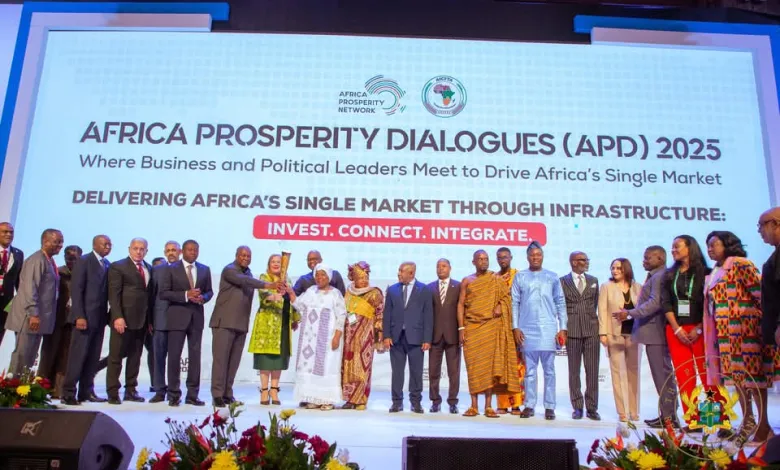Africa Prosperity Dialogues vital to continent’s single market agenda – President Mahama

President of the Republic John Dramani Mahama has stated that his government fully supports the vision and mission of the Africa Prosperity Dialogues (APD), an annual event organised by Africa Prosperity Network (APN) and the Africa Continental Free Trade Area (AfCFTA) Secretariat.

The Africa Prosperity Dialogues aims to bring business and political leaders together to discuss and agree on implementable policies that would drive Africa’s single market and the continent’s development, thereby creating jobs for the continent’s teeming youth population.
The APD 2025, held from Thursday, 30 January, to Saturday, 1 February 2025, was to assist African countries in moving from a fragmented continent to an integrated continent, and to develop policies to support continental efforts to bridge the infrastructure gap.
The dialogues also aimed to guide coordinated efforts among governments, business leaders, investors, and development partners for infrastructure development. The three-day dialogue series also highlighted key issues and recommendations that African countries must all commit to implementing.
President John Mahama made the support pledge when he addressed two of his colleague heads of state, H.E. Faure Essozimna Gnassingbé, President of the Republic of Togo, and H.E. Azali Assoumani, President of the Union of Comoros, and other attendees of the “Presidential and Business Executives Dialogue,” the final session of APD 2025, at the Accra International Conference Centre (AICC).

The theme for APD 2025 was “Delivering Africa’s Single Market Through Infrastructure: Invest, Connect, and Integrate.” President Mahama said the APD is a vital intervention that will help gather tangible ideas to propel intra-African trade and a vibrant single African market in the coming years.
“It is a great honour to address this distinguished gathering of Heads of State, policymakers, and business leaders, all united by a common vision of a prosperous and self-sufficient Africa.
“This conference exemplifies our shared commitment to unlocking Africa’s full potential and ensuring that the continent occupies its rightful position in the global economic landscape,” President Mahama remarked.
“The decisions we make at this conference must not end in resolutions alone. We must act with urgency, determination, and a shared vision for prosperity. Let us rise to the occasion, break down the barriers that divide us, and build a strong, self-reliant, and globally competitive Africa.
“As Ghana’s first President, Dr Kwame Nkrumah, once said: “The forces that unite us are intrinsic and greater than the superimposed influences that keep us apart.” Let us embrace those forces and chart a new path for Africa’s economic transformation,” Mahama further remarked.
Transit Guarantee Scheme
In his remarks, Wamkele Keabetswe Mene, Secretary-General of the African Continental Free Trade Area (AfCFTA) secretariat, announced that the much-anticipated “AfCFTA Transit Guarantee Scheme” will be launched this year, 2025.

He explained that the scheme, aimed at facilitating seamless trade across the continent, would ensure that goods transported along the Abidjan-Lagos corridor—and other regions—were covered by a single transit guarantee, eliminating the need for multiple payments.
According to Mr. Mene, “this scheme will allow goods to move across regions, from the ECOWAS region to other parts of the continent, under one unified cost of transit guarantee.” He emphasised the significance of this development, saying it would mark a milestone in Africa’s trade integration efforts.
Mene expressed immense pride in the progress made by the continent, noting that the AfCFTA Transit Guarantee Scheme would be the first of its kind globally. “The quality of our work is unparalleled, and it does not exist anywhere else. This is a historic moment for Africa,” he added.
Urgent action
For her part, Dr. Nkosazaana Dlamini Zuma, chairperson of the Advisory Council of the Africa Prosperity Network (APN), organisers of the Africa Prosperity Dialogues (APD), urged African countries aiming to streamline their digital transactions to use Ghana’s mobile payment platform as a benchmark.
She indicated that Africa needed a continental-wide mobile interoperability system, and therefore, the fragmentations across African Union (AU) member states further complicate efforts to establish a harmonised digital ecosystem.
To this end, Dr Zuma called on African countries to prioritise digital communication and financial platforms in the next five years by investing in broadband, expanding e-commerce, and using mobile platforms to unlock the potential of digital trade.

Key highlights
The deliberations at APD 2025 can be summed up in five key highlighted and recommendations that African countries must commit to, and they are Logistics & Transport, Access to affordable and sustainable Energy, Continent-wide Mobile System Interoperability, Social Infrastructure and Financing Infrastructure Development in Africa: Practical and Scalable Solutions
On Logistics & Transport, the panellists’ indicated that Africa’s infrastructure deficits significantly impede the free movement of people, goods, and services, with poorly maintained roads, limited airline system, outdated railways, and inefficient ports driving intra-African trade costs up by 30-40%.
According to the discussants, African countries must fully implement the Single African Air Transport Market (SAATM) and the Yamoussoukro Decision by deregulating air services and implementing the Africa Integrated Maritime Strategy 2050 (AIMS) to fully liberalise intra-African air transport in access, capacity, frequency, and tariffs.
Focusing on access to affordable and sustainable energy, the dialogue underscores the importance of energy and renewable infrastructure in powering industries, supporting digital economies, and ensuring sustainable development.
With over 30 African countries experiencing regular power outages, delegates called for collective and coordinated regional energy policies and the development of interconnected power grids to enhance reliability and affordability.

The Grand Inga Damn was cited as a major project that could provide energy solutions to the entire continent, yet it remains on paper. Africans must invest in this to solve the energy crisis it faces.
Policy fragmentation across African Union (AU) member states in the area of continent-wide mobile system interoperability, according to contributors at the APD 2025, further complicates efforts to establish a harmonised digital ecosystem.
The conference recommended that Africa prioritise the interoperability of communication and financial platforms within the next five years. Investments in broadband expansion, e-commerce platforms, mobile payment interoperability, and regulatory harmonisation to unlock the potential of digital trade must also be prioritised.
On social infrastructure, business leaders urged African countries to increase investment in pharmaceutical production to reduce dependency on imports and enhance healthcare resilience.
They noted that expanding technology access can improve healthcare delivery while leveraging digital finance solutions—such as mobile payments and health insurance platforms—can enhance affordability and accessibility.

Africa needs a dedicated Infrastructure Fund to unlock the $2 trillion in domestic capital from pension funds, insurance funds, and sovereign wealth funds. Mobilising these resources can provide a sustainable solution to the continent’s infrastructure financing challenges.
To make this fund effective, governments must implement key reforms, including streamlining regulations to allow long-term investments, introducing risk mitigation tools like blended finance and infrastructure bonds, and ensuring strong governance and transparency to build investor confidence.
Africa Trade Torch
The lighting of the Africa Trade Torch (ATT), an initiative of the Africa Business Council (ABC) that has been permanently moved to the Africa Prosperity Dialogues (APD), was observed. President John Mahama and his two other colleagues, heads of state, President Faure Essozimna Gnassingbé, and President Azali Assoumani, together with several business leaders, lit the torch.

The ATT is a private sector initiative to popularise the idea of the AfCFTA among African peoples and the African private sector, including owners of small and medium-sized enterprises, women, and the youth. ATT is an opportunity for the private sector to show its commitment to the operationalisation of the AfCFTA.
Reporting by Wilberforce Asare in Accra




